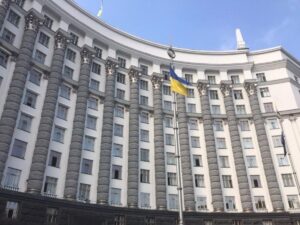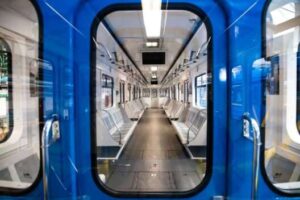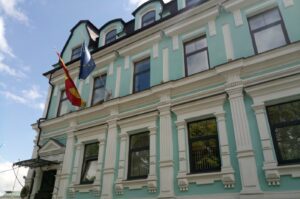
The bitcoin rate on Monday fell to its lowest level in more than a month, ether (Ether) – below $ 3,000.
The pressure on the cryptocurrency market is exerted by the general risk aversion of investors, as well as signals of restrained demand from new investors, Bloomberg notes.
As of 1:45 p.m., the bitcoin rate retreated 3.05% to $39,058. Earlier in the session, it fell below $39,000.
The exchange rate of ether fell by 4.2% to $2916.6.
Technical analysis shows that despite bitcoin’s recent drop, the cryptocurrency is “not yet close to oversold levels” and the nearest support level of $35,000 is likely not to hold, said 22V Research analyst John Rock.
“We remain confident that bitcoin will drop to $30,000,” the expert says.
The cost of bitcoin has fallen by 5% over the past month, and by almost 16% since the beginning of the year.
The capitalization of the global cryptocurrency market, according to CoinGecko, has decreased by 4% over the past 24 hours, to $1.9 trillion.

A number of transport services related to the transportation of goods were included by the Cabinet of Ministers of Ukraine into the list of critical import goods.
According to Government Decree No. 444 of April 12, 2022, published on the Uryadovy Portal, the list of critical imports included: cargo transportation by road vehicles and railway transport, sea and coastal freight transport services.
In addition, the list includes warehousing and storage services; services related to land and water transportation; cargo handling services, as well as other auxiliary transportation services.
As reported, after the start of Russia’s military aggression on February 24, the government on the same day, by decree No. 153, determined a list of critical import goods, for the purchase of which the National Bank of Ukraine allows buying foreign currency. Since then, the Cabinet of Ministers has made changes to this list more than 10 times.

A group of U.S. Democratic lawmakers, including four senators and a member of the House of Representatives, will travel to Poland, India, Germany, Nepal and the United Arab Emirates to garner support for Ukraine.
“This strong congressional delegation will have the opportunity to meet with U.S. military leadership and troops in Poland in order to learn how the U.S. can continue to support Ukraine and our NATO allies against Russia’s unprovoked and unwarranted war,” the lawmakers said in a joint statement, according to The Hill.
“In addition, the delegation will meet with a number of key foreign leaders in Poland, UAE, India, Nepal, and Germany to strengthen ties during this period of heightened global tension,” the congressmen said.
Other senators making the trip with Kelly are Kirsten Gillibrand (D-N.Y.), Cory Booker (D-N.J.), Ed Markey (D-MA), along with Rep. Mondaire Jones (D-N.Y.), the lone House member.
GERMANY, INDIA, NEPAL, POLAND, SUPPORT, U.S. DEMOCRATIC LAWMAKERS, UAE, UKRAINE

The Kyivstar mobile network operator, on the initiative of the Ministry of Education and Science of Ukraine, cancels mobile Internet billing in popular video call applications for prepaid subscribers.
The press service of the operator said on Monday that in particular, megabytes will not be taken into account from the accounts of prepaid subscribers for using the following applications: Zoom, Microsoft Teams, Google Meet and Google Classroom.
“We will definitely win the war, but now we need to gradually return to a full life. Adaptation and support for children is perhaps the most important and responsible task not only for parents and teachers, but for the whole society. Therefore, Kyivstar immediately responded to the proposal of the Ministry of Education and Science make applications that will broadcast online lessons for free, so that learning, mastering a new specialty and working online are even more accessible to our customers,” Kyivstar’s B2C Director Tetiana Lukyniuk said.
The company also added that the Lets Learn without Borders! service is valid in most Kyivstar tariffs and allows using popular educational applications without additional billing. Among them are Wikipedia, Coursera, Prometheus, E-School, etc.
“Despite hostilities on the territory of Ukraine, educational institutions continue to provide training in regions where the security situation allows. In addition, a national Ukrainian timetable has been created, the National E-School is functioning, and Ukrainian TV channels broadcast lessons for grades 5-11 as part of the Lets Learn without Borders! service. To provide even better conditions for learning and working online, the Ministry of Education and Science initiated the free use of mobile applications through which access to the educational process is provided. I am grateful to all organizations and institutions for cooperation,” Minister of Education and Science Serhiy Shkarlet said.
According to the report, the Ministry of Education has applied to other mobile network operators with a similar request and is waiting for a positive decision.

In the capital, from Monday, the time for transporting passengers in the subway and in land transport will be increased, the press service of the Kiev City State Administration reports.
“From today, the Kyiv metro will carry passengers from 06:30 to 20:00, ground transport – from 7:00 to 21:00,” reads a message published on the telegram channel on Monday.
The administration also reminded that in Kyiv and the Kiev region, a curfew lasts every night from 22:00 to 05:00.

Spain soon intends to return the embassy to Kyiv, Prime Minister Pedro Sanchez said on Monday.
“Soon we will reopen the Spanish embassy in Kyiv,” he said in an interview with the Antena 3 TV channel.
© 2016-2025, Open4Business. All rights reserved.
All news and diagrams placed on this Web site is made for internal use. Its reproduction or distribution in any form are welcome in case of placing a direct hyperlink to a source. Reproduction or distribution of information which contains Interfax-Ukraine as a source is prohibited without the written permission from the Interfax-Ukraine news agency. Photoes placed on this site are taken from open sources only; rightholder are welcome to make demands to info@open4business.com.ua , in this case we are ready to put your copyright to a photo or replace it.